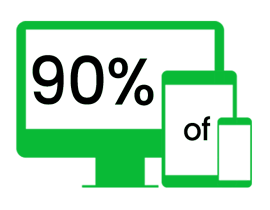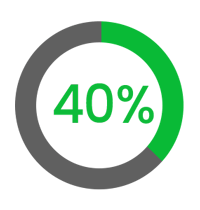WHAT DOES YOUR MOBILE PHONE MEAN TO YOU?
87% OF MILLENNIALS
have their smartphone with them at all times, and 68% say they check it within 15 mins of waking
How would you answer the question above?
Mobile phones affect nearly every aspect of our lives: relationships, work, shopping, research, entertainment, travel, art, health, food, finance, and communication. Try naming another device you own that has such a widespread effect on your daily life. Mobile phones have become tools to help us learn, plan, buy, connect, and solve problems.
Today, more searches take place on mobile phones than on computers. Mobile phones have become our first choice for fulfilling our wants and needs.
PRO-TIP: When reviewing your sites Analytics, segment users by device, then compare them to the previous period. Comparing 3, 6 and 12 month periods gives you a good snapshot of your users behavior.
IT’S NOT ABOUT SESSIONS ANYMORE
We spend 177 minutes on our phones every day
…BUT WE CHECK IT
150 TIMES A DAY
The customer buying path looks very different today compared to previous years. When we want or need something, we take part in short bursts of digital activity. From comparison shopping to vacation planning, the consumers buying path is now fractured into hundreds of tiny moments instead of one long online “session.”
In turn, marketing now happens in bursts. Mobile sessions average a mere 70 seconds, yet we make decisions faster than ever. While session duration has decreased, mobile conversion rates have increased 29% in just the last year.
PRO-TIP: Do you have your call and text message extensions set up? Give your customers the option to bypass your website and contact you directly.
BURST OF ACTION
20% INCREASE
in mobile’s share of online sessions…
…time spent per visit
DECREASED 18%
Google calls these bursts of digital activity “Micro-moments”. Some bursts are of personal nature, such as sending emails or posting selfies, however, many are open to the influence of brands: moments like planning a weekender, clothes shopping, choosing a restaurant, learning how to replace a faucet or finding a trusty mechanic.
These bursts are opportunities for companies to provide value to their potential customers. This is the new marketing funnel, and businesses need to be ready to capitalize on the immediacy of consumers’ needs.
PRO-TIP: Put in the time to build out multiple touch-points using channels such as Google, Bing, IG, FB and Linkedin. You can’t be a one-trick-pony anymore.
BEYOND MOBILE
![]()
of smartphone users turn to their phones for ideas in the middle of a task.
While mobile can be credited as the catalyst for this change, the impact reaches across all devices and offline channels. For example:
- Foot traffic in brick & mortar stores has declined, yet consumers are spending more per visit.
- Consumers are spending less time per session on websites, yet converting more often.
Why? These bursts of digital activity mean people are doing their research before visiting a store or website and are further along in the buying process. Think of small bursts as stepping stones that lead to more conversions.
PRO-TIP: Customers are walking into brick and mortar locations prepared to buy. Fewer “tire-kickers” means your staff will need to be re-trained to understand the urgency of helping make a sale.
HOW TO WIN WITH BURST MARKETING
Over half of all smartphone users discovered a new company or product when making a mobile search
Needing more diverse touch points in the funnel might lead you to believe that you need to be a larger brand, with a larger marketing budget to win in this environment. The opposites actually true. You don’t have to be a major brand to succeed in this new marketing landscape. These bursts are all about filling an immediate need.
People are more loyal to their needs in a particular moment than they are to a brand. Google shares 3 tips for winning these bursts.
BE THERE
Google breaks down four types of bursts in the buying journey:
I WANT TO KNOW
66% of smartphone users turn to their smartphones to learn more about something they saw in a TV commercial.
I WANT TO DO
70% Searches related to “how to” on YouTube are growing 70% year-over-year.
I WANT TO GO
2X “Near me” searches have grown 2x in the past year.
I WANT TO BUY
82% of smartphone users consult their phone while in a store.
Marketing used to be about Being There when the person was ready to buy. Now, successful campaigns are about Being There for the bursts throughout the journey, not just at the destination. Every time someone picks up a phone, a burst is taking place, and you need to Be There for it.
PRO TIP: Make sure you utilize all the ad types within each platform such as messenger ads, Gmail ads, lead form ads, video ads and display and remarketing ads (among others) to ensure you’re marketing to these “bursts.”
BE USEFUL
![]()
When a brand’s mobile site or app makes it easy for a smartphone user to find answers, 69% of those users are more likely to actually buy from that brand.
You’ve committed to Be There during these bursts. The next key thing is to Be Useful. Bursts are simply instances where buyers are chipping away at their decision. They want quick, snackable, relevant info rather than a hard sell.
PRO-TIPS for your website:
- E-commerce: concise descriptions, product reviews, instructional videos, easy checkout flow, quality product images
- Service: social media pages with pics, customer reviews, case studies, validations such as your BBB logo, visible contact info
BE QUICK
OVER 1 IN 3 USERS
are in a hurry when searching for a local business on their smartphones
Finally, you need to Be Quick. Remember, bursts are brief, and consumers are making decisions faster than ever. Whether researching a new laptop or looking for a local dentist, consumers are like toddlers, they want their applesauce NOW. They want immediate gratification. There is a heightened expectation for speed, so your mobile site needs to be quick and easy.
PRO-TIP: Make sure you move all important info to the top of the page, then test your sites speed with this tool:
REBUILD & REFRAME
When people use mobile search to help them make a decision, they are:
57% more likely to visit a store.
40% more likely to make a phone call.
51% more likely to make a purchase.
OF SMARTPHONE USERS
turn on their devices to help them make a product decision
The mobile movement has become the connective tissue between online and offline growth. Burst Marketing will not only improve online performance but also drive actions like in-store visits and phone calls that impact your bottom line.
Historically, a conversion simply meant that your “buy” button was clicked. Today, conversions need to account for every burst, across many devices along the journey. Burst marketing is about using Search, Display, Facebook and Instagram to connect the dots. Rebuild your strategy and re-frame your analytics to fit today’s consumer behavior.
PRO TIP: Closely monitor assisted conversions in your marketing funnel and experiment with different attribution models in Analytics.
CONNECT THE DOTS
 PEOPLE SAY THEY USE
PEOPLE SAY THEY USE
multiple screens for everyday activities
 SMARTPHONE USERS WHO SAY THEY
SMARTPHONE USERS WHO SAY THEY
research on their mobile device first before purchasing on a desktop
You don’t have walk-in customers, mobile customers and desktop customers. You just have customers.
The key is to stop viewing mobile and desktop conversions separately. Instead, measure the sum of all of your digital marketing inputs against profit. Remember:
- Mobile usually affects non-mobile sales. Consumers use mobile to look for prices, sizes, reviews or to call a business.
- Include multi-device behavior in your attribution strategy. Focus less on final conversions and more on the customer journey.
- Mobile calls are conversions. Calls typically convert better than website visits, especially for complex products like finance and insurance.
FIND OUT HOW BURST-MARKETING CAN HELP YOUR BUSINESS TODAY!

